Iceland in Winter by Laurence and Jessica Norah
We’re Laurence and Jessica, the travel blogging couple behind the travel blogs Finding the Universe and Independent Travel Cats. Visiting Iceland had long been on our wish list, so when Iceland Travel gave us the opportunity to do just that, we naturally leapt at it.
Our first trip to Iceland was in winter. In this post, we’re going to talk about why you might want to travel in Iceland in winter, and share some of the advantages (and disadvantages) of visiting this wonderful country in the cooler months, as well as our experiences with Iceland Travel.
The tour we took with Iceland travel was the Glorious Glaciers and Northern Lights self-drive road trip. This was an 8 day/7 night tour that focused on the west and south of the country.
We chose this trip because it covered many of the highlights of Iceland that we really wanted to see, including the spectacular waterfalls, black sand beaches and glaciers of the south coast, the Golden Circle, as well as a few less well-visited areas to the north of Reykjavik. It also gave us time to explore Reykjavik itself.
Of course, there were many options to choose from. Iceland Travel has a wide range of detailed self-drive road trip itineraries for Iceland which cover all the highlights of the country, as well as some of the more hidden attractions. These road trips are split up into summer and winter versions. Iceland in winter is very different to Iceland in summer, so the itineraries need to be tailored to the specific time of year.
We chose a self-drive trip for several reasons, and we’ll share below some of the main advantages as we see them.
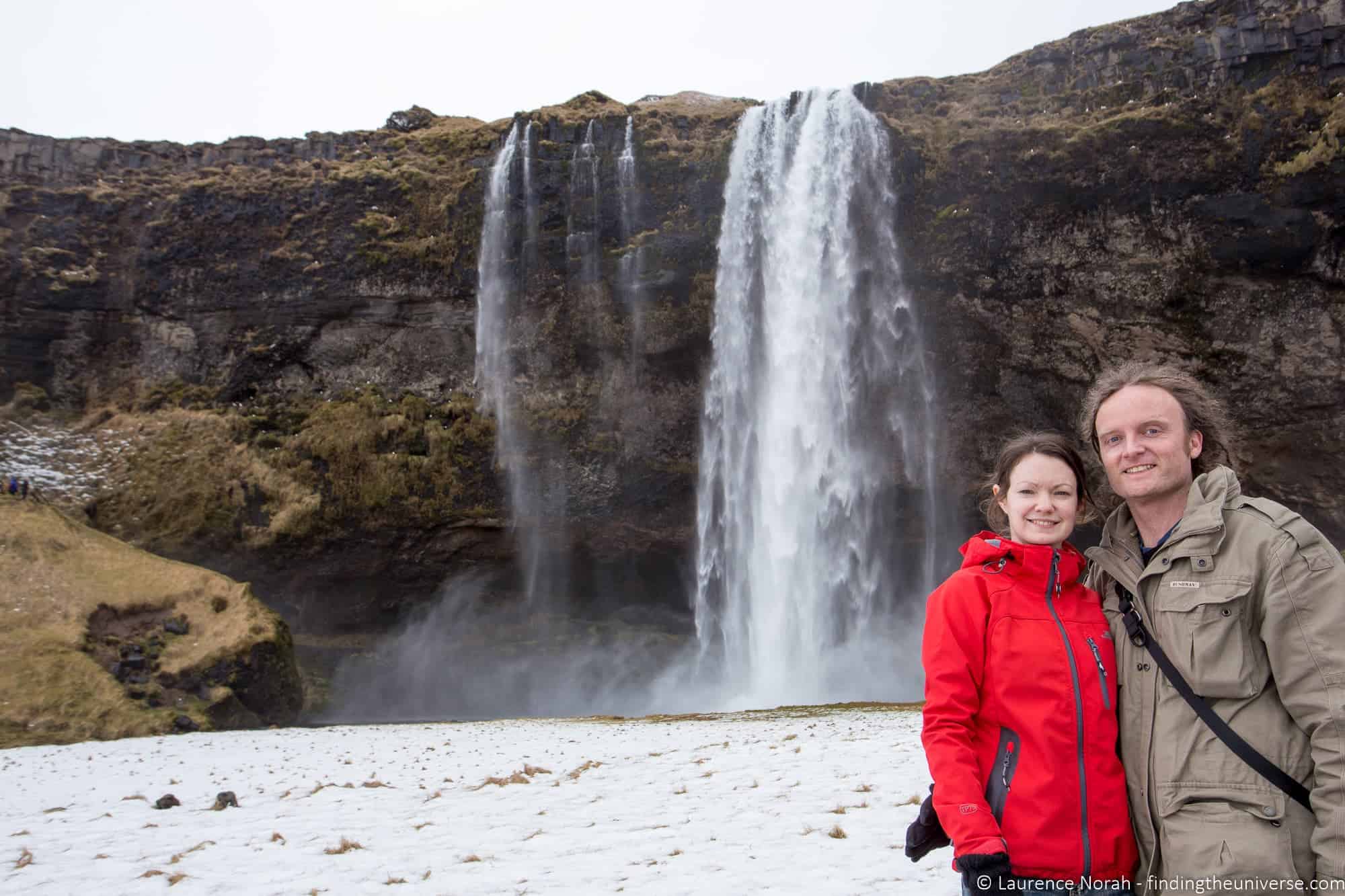
Why we chose a Self-drive trip during winter in Iceland
First, Iceland Travel booked both our hire car and our accommodation for our trip. There are a lot of options when it comes to both car hire and accommodation in Iceland, and it was helpful to let the experts handle both of these for us. We just selected the type of vehicle and comfort level of the accommodation we wanted, and they did everything else. The accommodation was then booked to align with each day on the chosen itinerary.
Next, because Iceland Travel are experts on Iceland, they had tailored this self-drive itinerary for Iceland’s winter months and weather. This meant that we didn’t have to figure out where was best to travel in winter – it had already been done for us.
Our trips also came with a few added extras. The most useful of these was the Iceland Travel companion – a tablet that was loaded up with a map of our route, our detailed itinerary, and loads of information on all the stops on the way. It also came with data, meaning we could use it for trip research and as a GPS unit.
By handling all the planning stuff, Iceland Travel let us focus on the fun stuff! All we had to do was turn up, drive, and sightsee. Being a self-drive trip also meant that we were flexible, and could stop for as long or short as we wanted at various locations along the way.
So let’s look now at some of the reasons we chose to travel with Iceland Travel in winter and some of the advantages of traveling at this time of year.
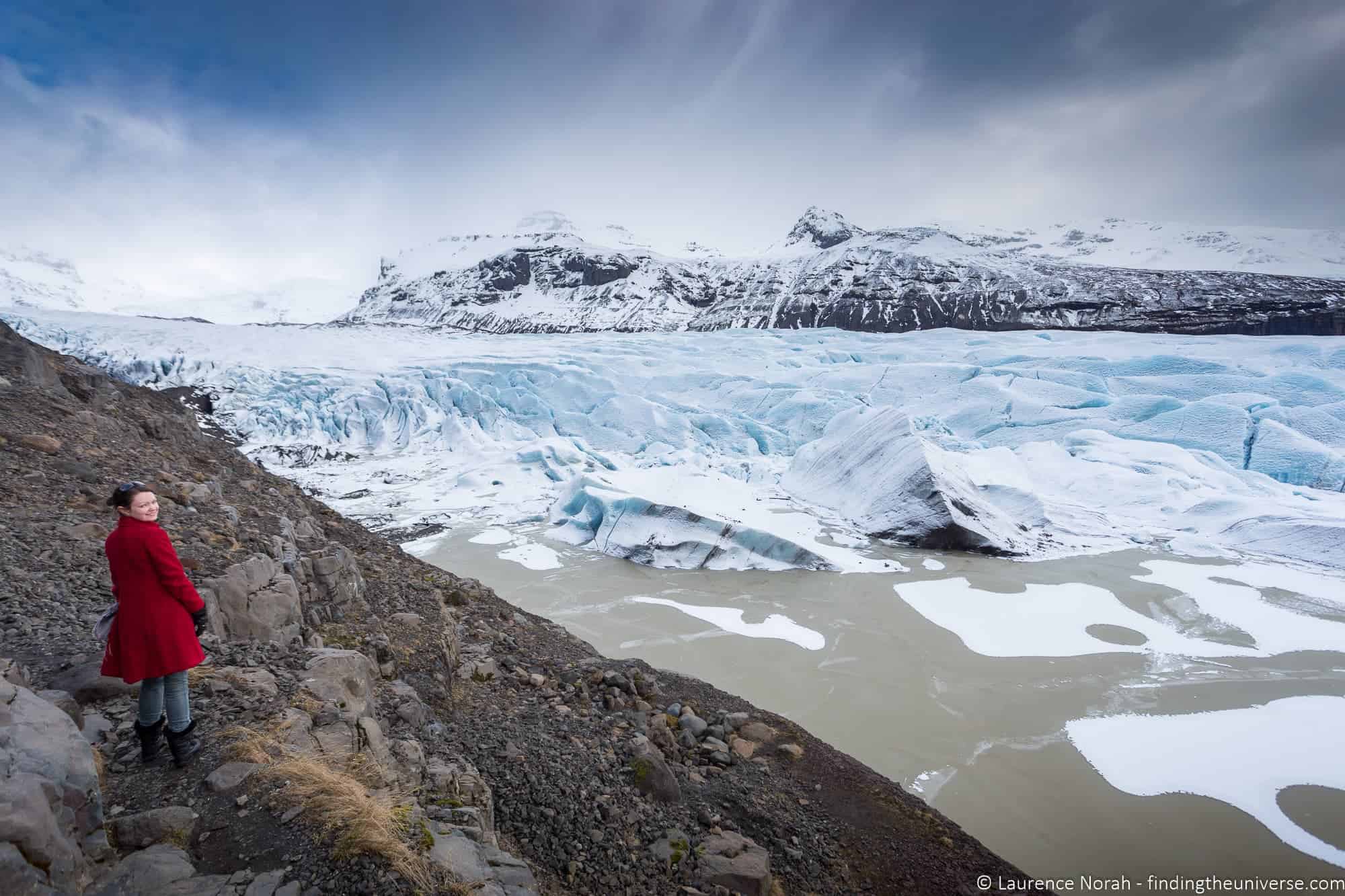
Reasons we chose to travel in winter with Iceland Travel
It’s less busy
Iceland is a very popular destination, and that popularity means that it can get a bit crowded, especially along the South Coast or anywhere that can be reached as a day trip from Reykjavik.
Whilst Winter is still a fairly popular time to visit Iceland, it is much less busy than the summer months, so you are more likely to have a bit more peace and quiet to enjoy the landscapes and nature.
To see the Northern Lights
One of Iceland’s major attractions are the Aurora Borealis, or Northern Lights. This is a spectacular display of colours in the night sky, which can occur between Autumn and Spring.
To see the northern lights you need dark, cloud free-skies without light pollution. Iceland has plentiful areas with no light pollution (although cloud-free can be more tricky!). Still, winter, with its short days and long nights, does afford excellent chances to see the Northern Lights when you travel.
Travelling with Iceland Travel on a self-drive tour also brings the benefit that you can drive yourself to a good location to see the Northern Lights, far from any light pollution. You can also look at local weather forecasts and figure out where might be the best place to see the northern lights from, depending on any forecast cloud cover.
Finally, when we travelled with Iceland Travel, pretty much all the hotels we stayed in had an “aurora alarm” service, meaning they would notify you in your room if there was activity, meaning you don’t have to stay up late for no reason.
Lower costs
Iceland is certainly not a budget destination by any stretch of the imagination. However, winter is the off-season, so prices for lodging tend to be cheaper, and there is greater availability as fewer people are travelling. So you can save a bit of money by travelling to Iceland in winter.
For more ideas on travelling in Iceland on a reduced budget, see our guide to travelling Iceland on a budget.
Stunning winter landscapes
Iceland is a country that varies dramatically by season, and we would say it is worth revisiting at different times of year to see the contrast.
Winter brings snowy landscapes and ice-filled waterfalls, making for beautiful viewing and photography opportunities.
Exclusive Winter Activities
There’s a lot to do year-round in Iceland, but the time of year you visit will definitely affect what is available. As well as Northern Lights viewing opportunities, winter brings with it a wide range of activities that are only available in this season.
Examples including snowmobiling, ice-caving, skiing, Christmas celebrations, and lots more – see our guide to winter activities in Iceland for more inspiration.
Of course, you have to decide what activities most interest you – if you are more into wildlife watching or other summer activities, winter might not be the time for you to visit!
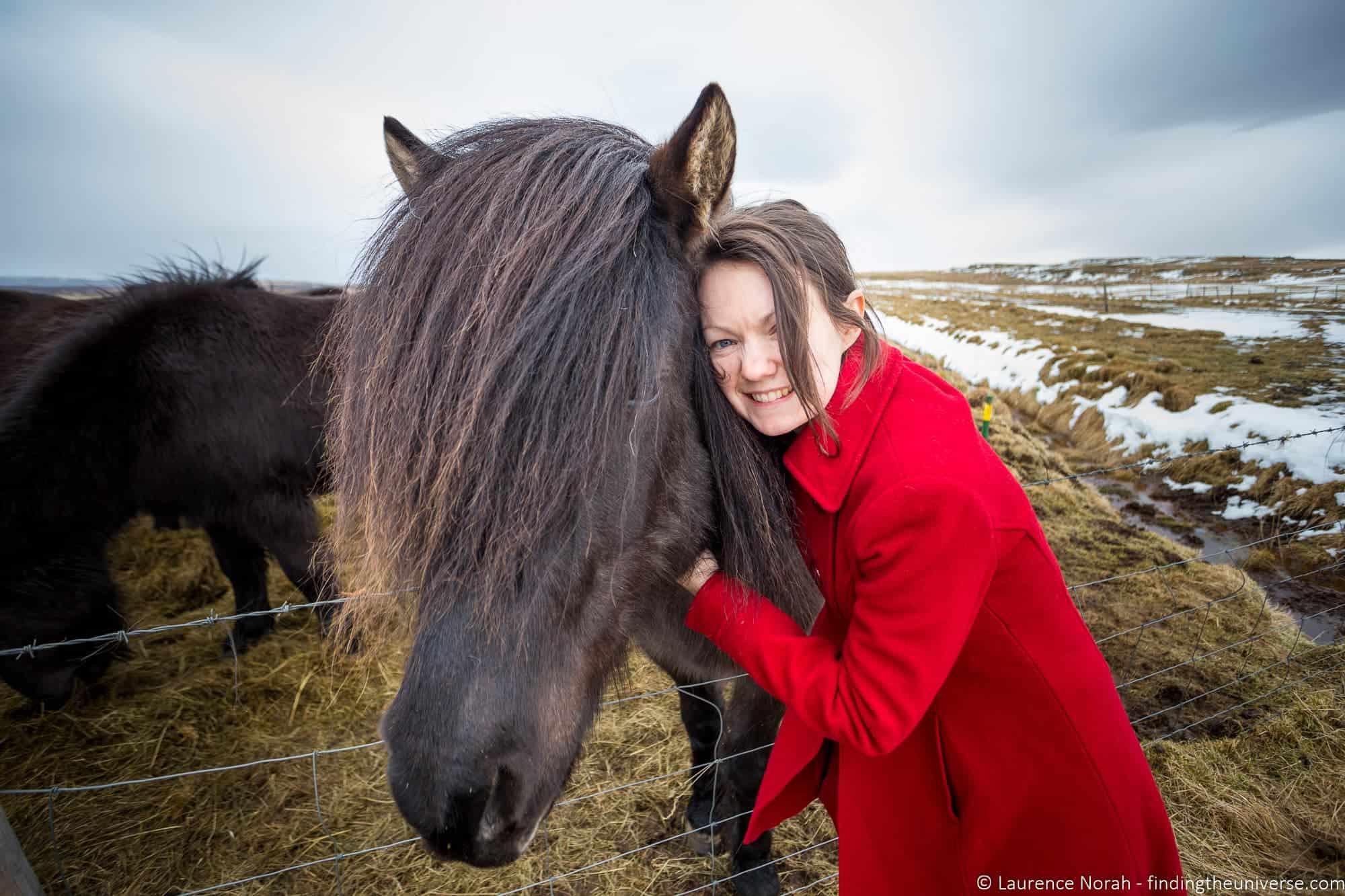
The tour we took with Iceland Travel
When we visited Iceland in winter, the tour we took with Iceland Travel was the Glacial Exploration and Auroras self-drive road trip. This tour focused on the south of the country. To learn more about our itinerary and day-to-day visits, you can read in detail about how we spent each of our 7 days in Iceland.
Focus on a smaller part of the country
In winter, Iceland Travel generally recommends (and we agree!), that it’s better to focus on a smaller part of the country for a self-drive tour, rather than trying to tackle a longer drive such as the popular Ring Road route that runs around the country.
Reduced daylight hours and potentially poor weather conditions mean that a longer drive will result in you missing a lot, and road closures due to the weather can put a serious dampener on your experience. If you really do want to do the Ring Road in winter, we’d instead suggest doing it as part of a group tour like this.
Iceland’s most famous landmarks and attractions
Anyway, back to the self-drive trip we took. This focused on the south of Iceland, west Iceland, Reykjavik and the well-known Golden Circle.
These areas of the country are less affected by the winter weather, and the driving distances on the trip are not so long on each day, meaning we could do a great deal of sight-seeing.
Our 7 day tour included 2 nights in Reykjavik (at the start and end of the tour), two nights in the west exploring the fjords near Borgarnes, a night on the Golden Circle, and two nights in the south of Iceland.
This let us see some of Iceland’s most famous landmarks and attractions, including the stunning waterfalls that the country is so well known for, as well as a few less well-known spots. We also had lots of time on the itinerary to see what we wanted to see – obviously, there were plenty of suggestions from the Iceland Travel team, but we were free to do and see what we wanted.
Some of our favourite stops included the stunning Thingvellir National Park, Gullfoss waterfall, Seljalandsfoss and Skogafoss waterfalls, and the black sand beaches near Vik. Of course, this just scratches the surface of what we saw – every day was filled with incredible sights and we loved every minute of our trip.
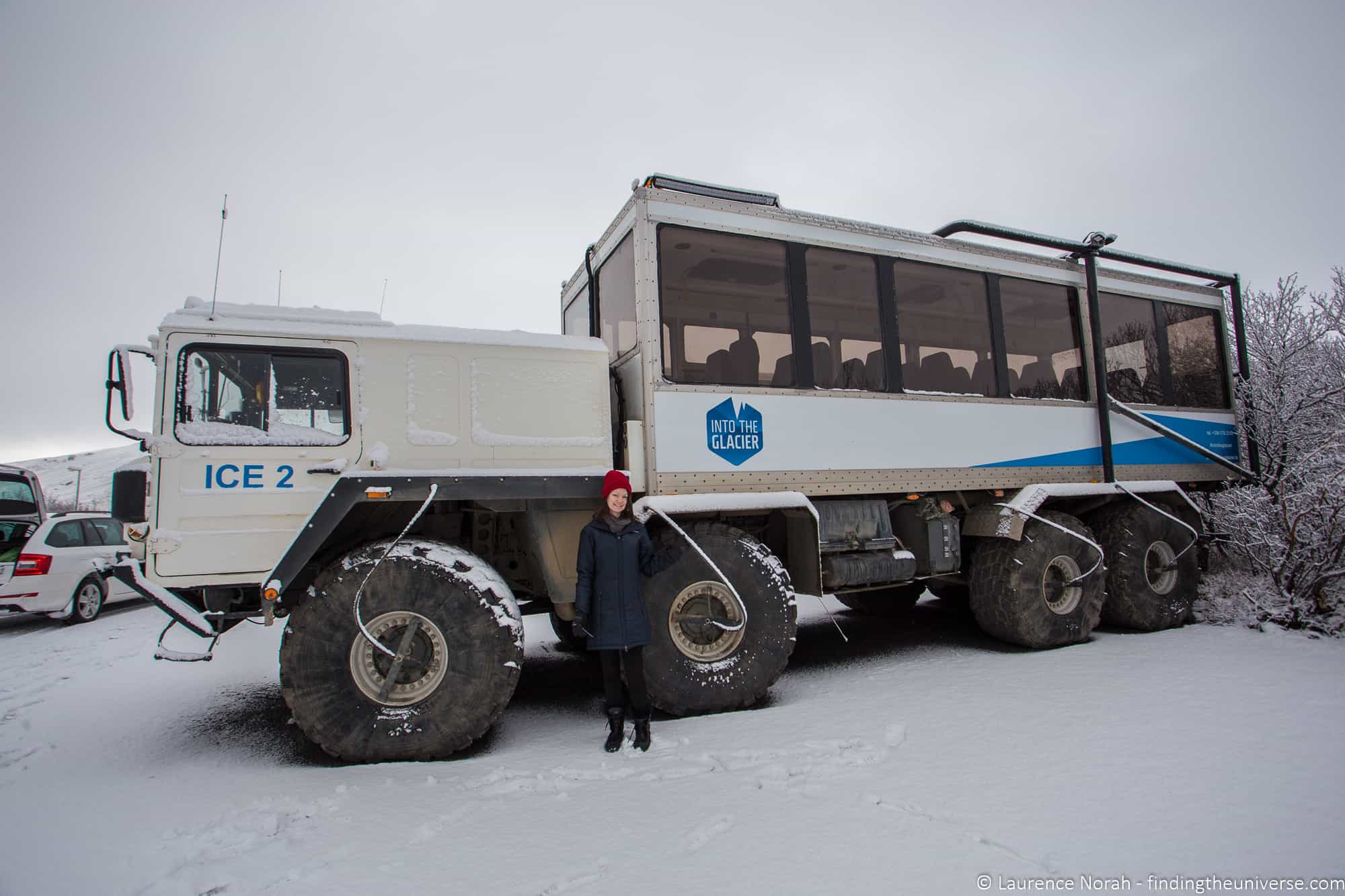
Alternatives to Self-Drive Travel in Iceland
Of course, it’s possible that you have read all of this and the thought of driving in Iceland in winter has you worried.
We appreciate that not everyone will be comfortable driving in unfamiliar conditions in a new country. Luckily, there are some excellent alternatives to driving yourself in Iceland that will still let you see all the attractions on offer.
Go on a guided tour
The first option, which is a very popular one, is to take a guided group tour. These are available throughout the year, and Iceland Travel offers a wide range of guided group tours on their websites, which range from two days up to almost two weeks.
Examples that we suggest you take a look at include the Hidden Powers & Northern Lights Hunt tour, the Complete Winter Tour, and Highlights of the South Shore tour.
A guided group tour is an excellent way to see a lot of the highlights of Iceland, meet some other like-minded travellers, have a lot of fun, and not have to worry about driving, map-reading or finding your hotel at the end of a long day of adventure. Everything will be taken care of for you – you just get to focus on the fun stuff!
Explore Iceland by joining a day tour
The other option, which we think is also an excellent idea, is to base yourself in Reykjavik, and to take a series of day trips from the city.
This works in both summer and winter, and you can see a great many of Iceland’s major attractions on day trips, including the Golden Circle, Snaefellsnes Peninsula and South Coast. You can also go on Northern Lights tours like this one and even head out to some of Iceland’s more wild areas, such as Landmannalaugar.
Basing yourself in the capital also means you’ll have a much wider choice of accommodation and dining options, as well as the opportunity to more thoroughly explore the city itself, which has plenty to offer the visitor, including some excellent museums and art installations.
For more tour ideas from the city, take a look at our guide to the best day trips from Reykjavik.
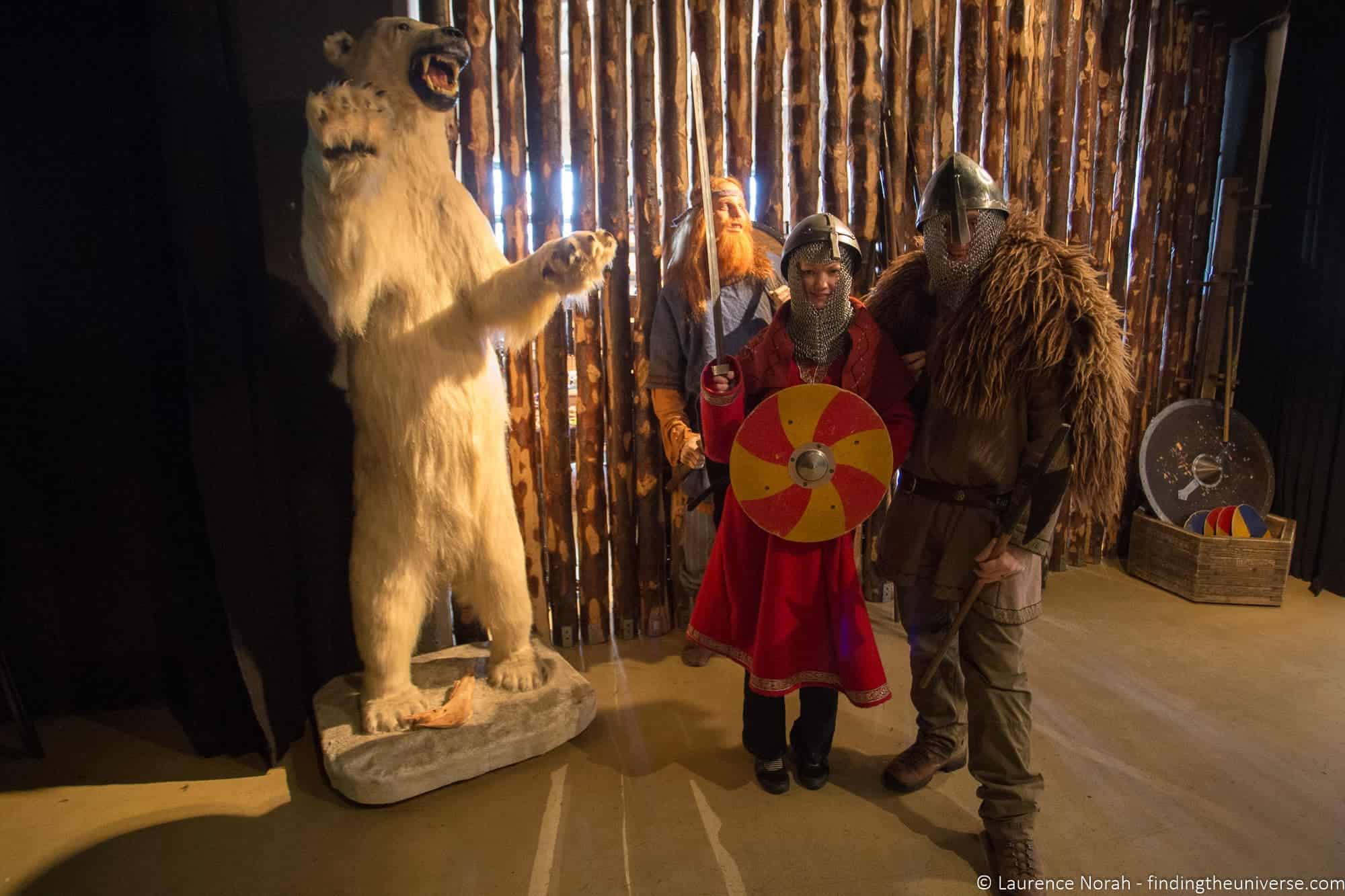
Did we enjoy our winter self-drive trip in Iceland?
The answer to this question is a definite yes! Iceland has a great deal to offer in winter, and we had a lot of fun in Iceland.
However, we would not suggest that winter is best for everyone. If you don’t think you’d enjoy the colder weather or shorter hours of daylight, you might be best visiting Iceland in late Spring or Summer. We also recommend that time of year for those who want to hike or focus on birdwatching come in the late Spring or summer months.
If you do decide to plan a winter trip, our main advice is to do a bit of research, read up about driving in Iceland in winter, and to just make sure you are appropriately prepared in terms of clothing and packing. See our guide to what to pack in Iceland in winter as a starting point for your packing.
Then, it’s just a question of picking the right type of trip for you and your travel style. Your starting point for that should definitely be the Iceland Travel homepage, where you’ll find a wide range of tours and activities to suit every travel style and budget. We can also recommend checking out our guide to planning a trip in Iceland for more advice on deciding what sort of trip to take in Iceland.